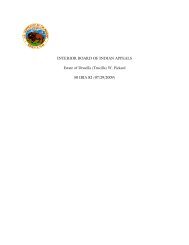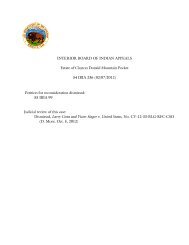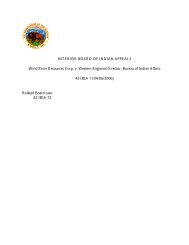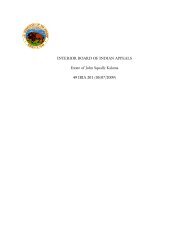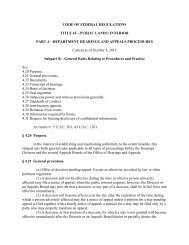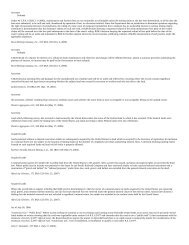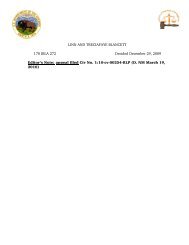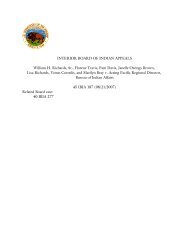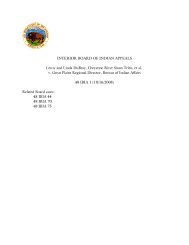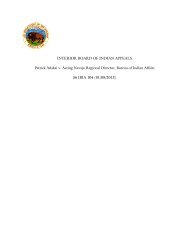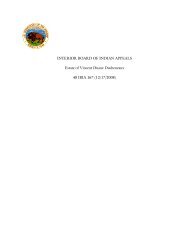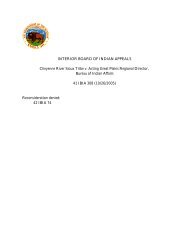56 IBIA 53 - About the Office of Hearings and Appeals
56 IBIA 53 - About the Office of Hearings and Appeals
56 IBIA 53 - About the Office of Hearings and Appeals
You also want an ePaper? Increase the reach of your titles
YUMPU automatically turns print PDFs into web optimized ePapers that Google loves.
INTERIOR BOARD OF INDIAN APPEALS<br />
William C. Tuttle v. Acting Western Regional Director, Bureau <strong>of</strong> Indian Affairs<br />
<strong>56</strong> <strong>IBIA</strong> <strong>53</strong> (12/18/2012)<br />
Related Board cases:<br />
36 <strong>IBIA</strong> 254<br />
Reconsideration denied, 36 <strong>IBIA</strong> 291<br />
41 <strong>IBIA</strong> 74<br />
46 <strong>IBIA</strong> 216<br />
Judicial review <strong>of</strong> this case:<br />
Tuttle v. Salazar, No. 13-CV-00365-RMC (D.D.C. compl. filed Mar. 21, 2013)
United States Department <strong>of</strong> <strong>the</strong> Interior<br />
OFFICE OF HEARINGS AND APPEALS<br />
INTERIOR BOARD OF INDIAN APPEALS<br />
801 NORTH QUINCY STREET<br />
SUITE 300<br />
ARLINGTON, VA 22203<br />
WILLIAM C. TUTTLE,<br />
Appellant,<br />
v.<br />
ACTING WESTERN REGIONAL<br />
DIRECTOR, BUREAU OF INDIAN<br />
AFFAIRS,<br />
Appellee.<br />
)<br />
)<br />
)<br />
)<br />
)<br />
)<br />
)<br />
)<br />
)<br />
Order Affirming Decision<br />
Docket No. <strong>IBIA</strong> 10-135<br />
December 18, 2012<br />
William C. Tuttle (Appellant) appealed to <strong>the</strong> Interior Board <strong>of</strong> Indian <strong>Appeals</strong><br />
(Board) from a July 19, 2010, decision (Decision) <strong>of</strong> <strong>the</strong> Acting Western Regional Director<br />
(Regional Director), Bureau <strong>of</strong> Indian Affairs (BIA). The Decision affirmed a March 2,<br />
2010, decision by <strong>the</strong> Colorado River Agency Superintendent (Superintendent) to cancel<br />
business lease No. B-509-CR between Appellant, as lessee, <strong>and</strong> <strong>the</strong> Colorado River Indian<br />
Tribes (Tribe), as lessor. We affirm <strong>the</strong> Decision because <strong>the</strong> record supports BIA’s<br />
findings that Appellant was not in compliance with <strong>the</strong> lease <strong>and</strong> failed to timely cure or<br />
excuse his noncompliance, <strong>and</strong> Appellant has not established that BIA’s decision to cancel<br />
<strong>the</strong> lease was unreasonable.<br />
I. Lease, Lease Modification, <strong>and</strong> Tuttle<br />
Background<br />
In 1977, Appellant <strong>and</strong> <strong>the</strong> Tribe entered into <strong>the</strong> lease, covering 98.24 acres <strong>of</strong><br />
tribal l<strong>and</strong>, for a 50-year term. The parties executed <strong>the</strong> lease in connection with <strong>the</strong><br />
settlement <strong>of</strong> litigation brought by <strong>the</strong> United States against Appellant (<strong>and</strong> o<strong>the</strong>rs) to quiet<br />
title to certain l<strong>and</strong>s in <strong>the</strong> name <strong>of</strong> <strong>the</strong> United States in trust for <strong>the</strong> Tribe. Lease<br />
(Administrative Record (AR) Tab 17). 1 Relevant to this appeal, <strong>the</strong> lease required<br />
1 The Superintendent approved <strong>the</strong> lease on March 31, 1977. On April 8, 1977, <strong>the</strong> U.S.<br />
District Court entered a judgment—stipulated <strong>and</strong> agreed to by Appellant—that <strong>the</strong> United<br />
States is <strong>the</strong> owner, in trust for <strong>the</strong> Tribe, <strong>of</strong> <strong>the</strong> property. See Judgment, United States v.<br />
Brigham Young Univ., William C. Tuttle, <strong>and</strong> Robert E. Tuttle, No. CV 72-3058-DWW<br />
(continued…)<br />
<strong>56</strong> <strong>IBIA</strong> <strong>53</strong>
Appellant to carry public liability insurance for personal injury <strong>and</strong> property damage in<br />
specified amounts <strong>of</strong> coverage, “to be written jointly to protect Lessee <strong>and</strong> Lessor,” <strong>and</strong> to<br />
furnish evidence <strong>of</strong> such coverage to BIA. Id. art. VI & Addendum art. 3.<br />
In 1986, <strong>the</strong> Tribe <strong>and</strong> Appellant executed a modification to <strong>the</strong> lease. See<br />
Modification No. 1 (AR Tab 16). 2 First, <strong>the</strong> lease, as modified, required Appellant to pay<br />
<strong>the</strong> Tribe, in addition to base rent, 3% <strong>of</strong> <strong>the</strong> gross receipts <strong>of</strong> all business conducted on <strong>the</strong><br />
leased premises. Id. (amending Lease art. IV). Second, in order to calculate this<br />
“percentage rent,” <strong>the</strong> lease was modified to require Appellant to submit annual “certified<br />
statements <strong>of</strong> gross receipts” for all business conducted on <strong>the</strong> leased premises. Id.<br />
(amending Lease art. IX). The statements must be prepared by an independent certified<br />
public accountant (CPA) in accordance with st<strong>and</strong>ard accounting procedures, <strong>and</strong><br />
accompanied by an opinion rendered by <strong>the</strong> CPA. Id.<br />
Appellant subsequently sought to challenge <strong>the</strong> 1986 lease modification, but <strong>the</strong><br />
Board upheld BIA’s decision to recognize <strong>the</strong> modification as a valid agreement between<br />
<strong>the</strong> parties. See Tuttle v. Acting Western Regional Director, 46 <strong>IBIA</strong> 216, 232-33 (2008). 3<br />
On ano<strong>the</strong>r issue raised in Tuttle, which is tangentially related to <strong>the</strong> present appeal, we<br />
held in favor <strong>of</strong> Appellant regarding <strong>the</strong> calculation <strong>of</strong> interest on certain base rent he had<br />
paid. On rem<strong>and</strong>, <strong>the</strong> Regional Director concluded that Appellant was entitled to a refund,<br />
credit, or <strong>of</strong>fset in <strong>the</strong> amount <strong>of</strong> $10,504.79. Letter from Regional Director to Appellant,<br />
Sept. 23, 2009 (AR Tab 18(5)). 4<br />
___________________________<br />
(…continued)<br />
(C.D. Cal. Apr. 8, 1977) (1977 Judgment) (copy attached to Response <strong>of</strong> Appellee to<br />
Appellants’ Opening Br. (Regional Director’s Answer Br.)).<br />
2 The Superintendent approved <strong>the</strong> modification on June 10, 1986.<br />
3 Three Board decisions, which involved procedural matters related to disputes between<br />
Appellant <strong>and</strong> <strong>the</strong> Tribe, preceded our 2008 decision. See Tuttle v. Western Regional<br />
Director, 41 <strong>IBIA</strong> 74 (2005) (appeal from BIA inaction); Tuttle v. Western Regional<br />
Director, 36 <strong>IBIA</strong> 254 (same), recon. denied, 36 <strong>IBIA</strong> 291 (2001). All citations to Tuttle in<br />
<strong>the</strong> present decision are to <strong>the</strong> 2008 decision, 46 <strong>IBIA</strong> 216.<br />
4 The Regional Director’s table <strong>of</strong> contents to <strong>the</strong> record identifies item 18 as <strong>the</strong> entire<br />
administrative record for <strong>the</strong> Superintendent’s lease cancellation decision. The record for<br />
<strong>the</strong> Superintendent’s decision is contained in a separate binder, subdivided by tabs 1-10.<br />
For convenience, we refer to <strong>the</strong> Superintendent’s record as “AR Tab 18,” with <strong>the</strong> tabs<br />
within <strong>the</strong> Superintendent’s record indicated in paren<strong>the</strong>ses. E.g., AR Tab 18(1).<br />
<strong>56</strong> <strong>IBIA</strong> 54
II.<br />
BIA’s Notice <strong>of</strong> Default <strong>and</strong> Lease Cancellation Decision<br />
On September 30, 2009, <strong>the</strong> Superintendent <strong>and</strong> <strong>the</strong> Tribe jointly issued a Default<br />
Notice notifying Appellant that he was in violation <strong>of</strong> several provisions in <strong>the</strong> lease.<br />
Default Notice at 2-5 (AR Tab 15). For one alleged violation—failure to pay base rent for<br />
<strong>the</strong> years 2005, 2006, <strong>and</strong> 2009—BIA <strong>and</strong> <strong>the</strong> Tribe agreed to deduct <strong>the</strong> amount owed<br />
($4420.80) from <strong>the</strong> amount credited to Appellant ($10,504.79) for interest<br />
overpayments, as a result <strong>of</strong> <strong>the</strong> rem<strong>and</strong> from Tuttle, <strong>and</strong> <strong>the</strong> Tribe agreed to waive this<br />
alleged default. Default Notice at 2-3; Lease art. IV. The Tribe declined, however, to<br />
waive <strong>the</strong> remaining three alleged violations, which eventually served as <strong>the</strong> grounds for<br />
BIA’s decision to cancel <strong>the</strong> lease. Default Notice at 3-5.<br />
First, <strong>the</strong> Superintendent <strong>and</strong> <strong>the</strong> Tribe found that Appellant had failed to pay <strong>the</strong><br />
annual percentage rent based on gross receipts since <strong>the</strong> fiscal year ending March 30, 1991.<br />
Default Notice at 3. Second, <strong>the</strong>y found that Appellant had failed to submit certified<br />
statements for <strong>the</strong> fiscal years 1992-2008 to document <strong>the</strong> amount <strong>of</strong> gross receipts. Id.<br />
at 4. Third, <strong>the</strong> Superintendent <strong>and</strong> <strong>the</strong> Tribe found that since 2005, <strong>the</strong> Tribe, as lessor<br />
<strong>and</strong> as agent <strong>of</strong> BIA, had not received evidence <strong>of</strong> a current public liability insurance policy<br />
jointly naming <strong>the</strong> Tribe as co-insured, <strong>and</strong> that fire <strong>and</strong> damage insurance documents on<br />
file with <strong>the</strong> Tribe were not current. Id. at 5. 5<br />
The Default Notice stated that Appellant had 10 business days to (1) cure <strong>the</strong><br />
violations, (2) dispute <strong>the</strong> violations or o<strong>the</strong>rwise explain why <strong>the</strong> lease should not be<br />
cancelled, or (3) request additional time to cure <strong>the</strong> violations. Id. 6<br />
Appellant responded to <strong>the</strong> Default Notice with a letter received by <strong>the</strong> Tribe on<br />
October 16, 2009. Letter from Appellant to Tribe, Oct. 14, 200[9] (AR Tab 14). 7 On <strong>the</strong><br />
percentage rent issue, Appellant stated that “[t]he average annual income from sublease<br />
payments is approximately $11,000.00,” <strong>and</strong> based on that figure, Appellant calculated <strong>the</strong><br />
percentage rent due since 1991 to be $<strong>56</strong>00. Id. at 1. After subtracting <strong>the</strong> base rent owed<br />
5 The Default Notice also stated that evidence previously provided by Appellant for <strong>the</strong><br />
2000-2005 period, consisting <strong>of</strong> an application for insurance, did not comply with <strong>the</strong><br />
requirements <strong>of</strong> <strong>the</strong> lease. Default Notice at 5.<br />
6 The Default Notice cited 25 C.F.R. § 162.118, but <strong>the</strong>re is no such section, <strong>and</strong> it is<br />
apparent that <strong>the</strong> Superintendent <strong>and</strong> <strong>the</strong> Tribe intended to cite § 162.618 as <strong>the</strong> regulatory<br />
provision upon which <strong>the</strong>y were relying for <strong>the</strong> notice <strong>of</strong> violation.<br />
7 The letter was dated October 14, 2006, but that was a typographical error; <strong>the</strong> year was<br />
2009. Appellant first sent an undated letter to <strong>the</strong> Tribe, received by <strong>the</strong> Tribe on<br />
October 13, 2009, stating that his response would follow shortly. See Letter from<br />
Appellant to Tribe, undated (Tribe’s Answer Br., Ex. C).<br />
<strong>56</strong> <strong>IBIA</strong> 55
($4420.80) <strong>and</strong> his estimate <strong>of</strong> <strong>the</strong> percentage rent owed ($<strong>56</strong>00), from <strong>the</strong> interest<br />
overpayment credited to him, Appellant calculated that he still had a credit or refund due to<br />
him in <strong>the</strong> amount <strong>of</strong> $483.99. Appellant also stated that <strong>the</strong> percentage rent was being<br />
“paid under protest” <strong>and</strong> that he intended to appeal Tuttle to Federal court. Id. In<br />
response to <strong>the</strong> allegation that he was in violation <strong>of</strong> <strong>the</strong> requirement to provide a certified<br />
statement from a CPA concerning <strong>the</strong> gross receipts, Appellant stated that he would “prefer<br />
not to incur <strong>the</strong> expense <strong>of</strong> having a [CPA] verify this simple information,” <strong>and</strong> he asked<br />
that this requirement be waived. Id. at 2. And finally, Appellant stated that he was<br />
enclosing <strong>the</strong> insurance verification information requested. Enclosed with his response was<br />
an invoice to Rio Valley Estates LLC showing a payment received on September 17, 2009,<br />
for a “L<strong>and</strong>owners General Liability” insurance policy for <strong>the</strong> subsequent year. Id., Attach.<br />
The invoice did not identify <strong>the</strong> terms <strong>of</strong> <strong>the</strong> policy or identify <strong>the</strong> Tribe as an additional<br />
insured party. No copy <strong>of</strong> an actual policy was submitted. Appellant did not request<br />
additional time to address <strong>the</strong> violations.<br />
On March 2, 2010, <strong>the</strong> Superintendent issued a decision terminating <strong>the</strong> lease,<br />
finding that Appellant had not cured <strong>the</strong> violations. Superintendent’s Decision at 1-2 (AR<br />
Tab 13). The Superintendent found that Appellant’s estimate <strong>of</strong> gross receipts did not<br />
conform to <strong>the</strong> reporting requirements in <strong>the</strong> lease because it was not compiled or verified<br />
by a CPA. Id. at 2-3. In <strong>the</strong> absence <strong>of</strong> a certified statement <strong>of</strong> gross receipts, <strong>the</strong><br />
Superintendent also concluded that <strong>the</strong> amount <strong>of</strong> unpaid percentage rent could not be<br />
calculated, <strong>and</strong> thus could not be deducted from any remaining balance credited to<br />
Appellant for his interest overpayments. Id. at 3. Finally, <strong>the</strong> Superintendent found that<br />
<strong>the</strong> insurance invoice provided by Appellant did not fulfill <strong>the</strong> lease requirements because<br />
(1) it did not name <strong>the</strong> Tribe as jointly insured, (2) it did not state <strong>the</strong> amount <strong>of</strong> coverage,<br />
<strong>and</strong> (3) it did not show that Appellant had fire <strong>and</strong> damage insurance. Id. at 4. Because<br />
Appellant had failed to cure <strong>the</strong>se three violations, <strong>the</strong> Superintendent terminated <strong>the</strong> lease.<br />
Id.<br />
Appellant <strong>the</strong>n notified <strong>the</strong> Regional Director that he wished to “cure all violations<br />
<strong>and</strong> do it as quickly as possible” <strong>and</strong> requested 45 days in which to do so. Letter from<br />
Appellant to Regional Director, Mar. 11, 2010 (AR Tab 12). Appellant stated that his<br />
insurance agent had been out <strong>of</strong> <strong>the</strong> <strong>of</strong>fice due to illness, <strong>and</strong> that his accountant would be<br />
available after April 15. Appellant also appealed <strong>the</strong> Superintendent’s decision to <strong>the</strong><br />
Regional Director. Notice <strong>of</strong> Appeal to Regional Director, Apr. 1, 2010 (AR Tab 11).<br />
On May 6, 2010, Appellant submitted a letter titled “Statement <strong>of</strong> Reasons,” in<br />
which he <strong>of</strong>fered to send <strong>the</strong> requisite pro<strong>of</strong> <strong>of</strong> insurance <strong>and</strong> stated that his accountant was<br />
working on <strong>the</strong> certified accounting statements. Letter from Appellant to Regional<br />
Director, May 6, 2010 (AR Tab 8). Appellant indicated that he would “send [BIA] a few<br />
thous<strong>and</strong> dollar check to show [his] good faith.” Id. He also stated that he had suffered a<br />
medical emergency on April 19, 2010. Id. BIA received a $4800 check from Appellant<br />
<strong>56</strong> <strong>IBIA</strong> <strong>56</strong>
several days later. Copy <strong>of</strong> Check, received May 10, 2010 (AR Tab 9). The record does<br />
not indicate that Appellant ever sent <strong>the</strong> pro<strong>of</strong> <strong>of</strong> insurance.<br />
The Regional Director acknowledged receipt <strong>of</strong> <strong>the</strong> check, but stated that <strong>the</strong><br />
“statement <strong>of</strong> reasons” had failed to explain how <strong>the</strong> Superintendent’s cancellation decision<br />
was erroneous. Letter from Regional Director to Appellant, May 17, 2010 (AR Tab 7).<br />
The Regional Director granted Appellant 10 days to submit a new statement <strong>of</strong> reasons,<br />
while noting that he was not providing Appellant additional time to cure <strong>the</strong> violations. Id.<br />
The Regional Director deposited <strong>the</strong> check into a “Special Deposit Account” pending<br />
completion <strong>of</strong> <strong>the</strong> appeals process <strong>and</strong> retained it pursuant to 25 C.F.R. § 162.621<br />
(requiring continuing payment <strong>of</strong> rent <strong>and</strong> compliance with lease terms during appeals <strong>of</strong><br />
cancellation actions). Id.; see also AR Tab 9.<br />
Appellant <strong>the</strong>n submitted a formal statement <strong>of</strong> reasons to <strong>the</strong> Regional Director on<br />
May 25, 2010. Statement <strong>of</strong> Reasons to Regional Director (AR Tab 6). Appellant argued<br />
that <strong>the</strong> lease violations had “largely been . . . resolved” <strong>and</strong> that <strong>the</strong> delays in curing <strong>the</strong><br />
violations were caused by “health issues” <strong>and</strong> by <strong>the</strong> unavailability <strong>of</strong> his accountant. Id.<br />
at 1. He argued that any uncured violations were “so close to full <strong>and</strong> final resolution or so<br />
de minimis non curat lex that <strong>the</strong>re is no legitimate basis for citing <strong>the</strong>m as reasons for Lease<br />
termination.” Id. at 2.<br />
Appellant included with his statement <strong>of</strong> reasons a CPA-prepared “Compilation<br />
Report” that had entries for 1995 <strong>and</strong> for 2002 through 2008. Id., Attach. 1 at 2<br />
(unnumbered). The cover letter from <strong>the</strong> CPA stated that <strong>the</strong> accompanying statement<br />
relied on information used by Appellant for Federal income tax purposes, “which is a basis<br />
<strong>of</strong> accounting o<strong>the</strong>r than U.S. generally accepted accounting principles.” Id. at 1. The CPA<br />
stated that he had not audited or reviewed <strong>the</strong> accompanying statement <strong>and</strong>, “accordingly,<br />
[did] not express [a]n opinion or any o<strong>the</strong>r form <strong>of</strong> assurance on it.” Id. According to <strong>the</strong><br />
CPA, “[m]anagement has elected to omit substantially all <strong>of</strong> <strong>the</strong> disclosures required by<br />
generally accepted accounting principles.” Id. The CPA’s Compilation Report, based on<br />
<strong>the</strong> 8 years between 1992 <strong>and</strong> 2009 for which Appellant had provided information,<br />
estimated <strong>the</strong> percentage rent owed by Appellant as $16,970.36. Id. at 2.<br />
Appellant also attached to his statement <strong>of</strong> reasons a sheet <strong>of</strong> h<strong>and</strong>written<br />
calculations, apparently done by Appellant, showing that he owed <strong>the</strong> Tribe a balance <strong>of</strong><br />
$5408.10 (after deducting <strong>the</strong> interest overpayment credit from <strong>the</strong> Tuttle rem<strong>and</strong>, <strong>and</strong> <strong>the</strong><br />
$4800 payment made with his initial statement <strong>of</strong> reasons). Appellant enclosed a check for<br />
that amount. Statement <strong>of</strong> Reasons to Regional Director at 4 & Attach. 2. The Tribe<br />
submitted a brief that requested termination <strong>of</strong> <strong>the</strong> lease. AR Tab 5.<br />
The Regional Director affirmed <strong>the</strong> Superintendent’s decision to cancel <strong>the</strong> lease.<br />
Decision (AR Tab 3). He first noted that during <strong>the</strong> cure period, Appellant had indicated<br />
<strong>56</strong> <strong>IBIA</strong> 57
that he intended to challenge Tuttle <strong>and</strong> had asked for a waiver <strong>of</strong> <strong>the</strong> accounting<br />
requirements in <strong>the</strong> lease. The Regional Director also noted that no fur<strong>the</strong>r response (or<br />
attempt to cure) was made “until long after <strong>the</strong> cure period provided for in <strong>the</strong> Lease had<br />
expired,” <strong>and</strong> only after Appellant had received <strong>the</strong> Superintendent’s cancellation decision.<br />
Decision at 4. 8 The Regional Director found that, as <strong>of</strong> <strong>the</strong> date <strong>of</strong> <strong>the</strong> Decision, <strong>the</strong><br />
violations had still not been cured. Id. at 5.<br />
The Regional Director also found that, even taking <strong>the</strong> Compilation Report to be<br />
correct, <strong>the</strong> amount <strong>of</strong> percentage rent that Appellant owed <strong>the</strong> Tribe exceeded <strong>the</strong> total<br />
value <strong>of</strong> <strong>the</strong> remaining interest overpayment <strong>and</strong> <strong>the</strong> two checks. Id. The Regional<br />
Director concluded that if <strong>and</strong> when <strong>the</strong> termination <strong>of</strong> <strong>the</strong> lease became final, <strong>the</strong> two<br />
checks <strong>and</strong> <strong>the</strong> remaining interest overpayment would be applied to Appellant’s debt to <strong>the</strong><br />
Tribe. Id.<br />
III.<br />
Appeal to <strong>the</strong> Board <strong>and</strong> Arguments on Appeal<br />
Appellant appealed <strong>the</strong> Decision to <strong>the</strong> Board. Appellant filed a statement <strong>of</strong> reasons<br />
<strong>and</strong> an opening brief, both <strong>the</strong> Tribe <strong>and</strong> <strong>the</strong> Regional Director filed answers, <strong>and</strong><br />
Appellant filed a reply.<br />
Appellant also filed a “Supplemental Reply Brief,” which <strong>the</strong> Regional Director <strong>and</strong><br />
Tribe moved to strike. Appellant <strong>the</strong>n sought leave to file ano<strong>the</strong>r supplemental brief,<br />
which <strong>the</strong> o<strong>the</strong>r parties also opposed. We find <strong>the</strong> opposition to our consideration <strong>of</strong> <strong>the</strong>se<br />
late-filed pleadings to be well-taken, <strong>and</strong> we strike <strong>the</strong>m accordingly. We note, however,<br />
that <strong>the</strong>se additional pleadings add little or nothing to <strong>the</strong> arguments already presented in<br />
some form by Appellant, <strong>and</strong> would not affect <strong>the</strong> outcome <strong>of</strong> this appeal even if <strong>the</strong>y were<br />
considered.<br />
In his notice <strong>of</strong> appeal, Appellant contends that <strong>the</strong> lease termination was erroneous<br />
because <strong>the</strong> disputes “have largely been addressed” <strong>and</strong> that “any remaining deficiencies<br />
ei<strong>the</strong>r have been resolved at this time, are so close to full <strong>and</strong> final resolution or so<br />
[insignificant] that <strong>the</strong>re is no legitimate basis for citing <strong>the</strong>m as reasons for Lease<br />
termination.” Notice <strong>of</strong> Appeal at 1, 2. Appellant argues that his delays in responding to<br />
BIA resulted from health issues experienced by Appellant <strong>and</strong> <strong>the</strong> unavailability <strong>of</strong> his CPA.<br />
8 The Superintendent’s Default Notice stated that Appellant had 10 days to cure <strong>the</strong><br />
violations, but <strong>the</strong> lease itself provides a 30-day cure period for payment violations <strong>and</strong> a<br />
60-day cure period for o<strong>the</strong>r violations. See Lease, Addendum, art. 17; Default Notice at 5.<br />
Although Appellant did not challenge <strong>the</strong> Superintendent’s decision based on a defective<br />
Default Notice, we note that <strong>the</strong> Regional Director correctly understood that <strong>the</strong> cure<br />
periods were governed by <strong>the</strong> terms <strong>of</strong> <strong>the</strong> lease itself.<br />
<strong>56</strong> <strong>IBIA</strong> 58
Id. at 1. Appellant also contends that BIA lacked authority to terminate <strong>the</strong> lease because<br />
“[t]here has never been a lawful determination that <strong>the</strong> [leased premises are] eligible for<br />
[BIA] leasing on [<strong>the</strong> Tribe’s] behalf.” Id. at 2.<br />
In his opening brief, Appellant does not repeat or exp<strong>and</strong> on <strong>the</strong> assertions in his<br />
notice <strong>of</strong> appeal that <strong>the</strong> lease termination was erroneous, except to contend that “<strong>the</strong><br />
record shows” that he cured <strong>the</strong> default “but [he] is being evicted solely to satisfy [<strong>the</strong><br />
Tribe].” Opening Br. at 3. Appellant devotes <strong>the</strong> remainder <strong>of</strong> his opening brief to arguing<br />
that BIA could not lease <strong>the</strong> property “on behalf <strong>of</strong>” <strong>the</strong> Tribe because, according to<br />
Appellant, <strong>the</strong> l<strong>and</strong> is not under <strong>the</strong> jurisdiction <strong>of</strong> BIA, but instead is under <strong>the</strong> jurisdiction<br />
<strong>of</strong> <strong>the</strong> Department <strong>of</strong> <strong>the</strong> Interior’s (Department) Bureau <strong>of</strong> L<strong>and</strong> Management (BLM).<br />
The Regional Director <strong>and</strong> <strong>the</strong> Tribe respond to Appellant by arguing that he fails to<br />
address <strong>the</strong> facts <strong>and</strong> circumstances that led to BIA’s decision to cancel <strong>the</strong> lease, i.e., BIA’s<br />
findings that Appellant had not timely cured several violations <strong>of</strong> <strong>the</strong> lease. The Regional<br />
Director <strong>and</strong> <strong>the</strong> Tribe also argue that <strong>the</strong> Board may not or should not consider<br />
Appellant’s contentions that BIA lacked authority to lease <strong>the</strong> property on behalf <strong>of</strong> <strong>the</strong><br />
Tribe or to cancel <strong>the</strong> lease.<br />
In his reply brief, Appellant argues that <strong>the</strong> Tribe “should have consented to <strong>the</strong> late<br />
resolution <strong>of</strong> issues,” <strong>and</strong> reiterates his assertions that <strong>the</strong> disputes “have largely been<br />
addressed <strong>and</strong> [<strong>the</strong>] deficiencies resolved as <strong>of</strong> this date,” that he timely reported health<br />
issues (including his hospitalization for several days) <strong>and</strong> <strong>the</strong> unavailability <strong>of</strong> his CPA, <strong>and</strong><br />
that any remaining deficiencies are so minimal that lease cancellation is not justified. Reply<br />
Br. at 1-2. Appellant also reiterates his assertion that <strong>the</strong> l<strong>and</strong> is under <strong>the</strong> jurisdiction <strong>of</strong><br />
BLM or <strong>the</strong> Department’s Bureau <strong>of</strong> Reclamation, <strong>and</strong> thus BIA could not terminate <strong>the</strong><br />
“Federal Lease.” Reply Br. at 3.<br />
I. St<strong>and</strong>ard <strong>of</strong> Review<br />
Discussion<br />
Interpretations <strong>of</strong> lease provisions are questions <strong>of</strong> law, which <strong>the</strong> Board reviews de<br />
novo. Seminole Tribe <strong>of</strong> Florida v. Eastern Regional Director, <strong>53</strong> <strong>IBIA</strong> 195, 210 (2011), <strong>and</strong><br />
cases cited <strong>the</strong>rein. When a BIA decision involves <strong>the</strong> exercise <strong>of</strong> discretion, <strong>the</strong> Board will<br />
not substitute its own judgment for BIA’s, but will review de novo <strong>the</strong> sufficiency evidence<br />
to support BIA’s decision, <strong>and</strong> will also review <strong>the</strong> sufficiency <strong>of</strong> BIA’s explanation. Id. It<br />
is Appellant’s burden to prove that BIA’s decision was erroneous, was not supported by<br />
substantial evidence, or was an abuse <strong>of</strong> discretion. See id.<br />
<strong>56</strong> <strong>IBIA</strong> 59
II.<br />
BIA’s Authority to Cancel <strong>the</strong> Lease<br />
Appellant’s arguments that BIA did not have authority to lease <strong>the</strong> property on<br />
behalf <strong>of</strong> <strong>the</strong> Tribe, <strong>and</strong> thus did not have authority to cancel <strong>the</strong> lease, are raised for <strong>the</strong><br />
first time on appeal. The Board does not ordinarily consider arguments that were not first<br />
raised before <strong>the</strong> BIA <strong>of</strong>ficial whose decision is under review or issues that were not within<br />
<strong>the</strong> scope <strong>of</strong> <strong>the</strong> decision being reviewed. 43 C.F.R. § 4.318 (“An appeal will be limited to<br />
those issues that were before . . . <strong>the</strong> BIA <strong>of</strong>ficial on review.”); Wind River Alliance v. Rocky<br />
Mountain Regional Director, 52 <strong>IBIA</strong> 224, 227 (2010) (“The Board has a well-established<br />
general rule that it will not consider arguments or issues raised for <strong>the</strong> first time on appeal<br />
to <strong>the</strong> Board.”); Trenton Indian Service Area v. Great Plains Regional Director, 54 <strong>IBIA</strong> 298,<br />
303 (2012) (“The scope <strong>of</strong> <strong>the</strong> Board’s review ordinarily is limited to <strong>the</strong> issues addressed<br />
in <strong>the</strong> decision under review.”). We see no reason to depart from that rule here, <strong>and</strong> thus<br />
we decline to consider this argument. 9<br />
III.<br />
Termination Decision<br />
The Superintendent terminated <strong>the</strong> lease, <strong>and</strong> <strong>the</strong> Regional Director affirmed <strong>the</strong><br />
termination, because Appellant had violated several lease provisions <strong>and</strong> had failed to cure<br />
<strong>the</strong>m during lease’s cure period. On appeal, Appellant does not dispute his failure to cure<br />
<strong>the</strong> violations within <strong>the</strong> cure period provided in <strong>the</strong> lease, nor does he argue that BIA<br />
violated any <strong>of</strong> his procedural rights, see supra note 8. Instead, Appellant argues that by <strong>the</strong><br />
time he filed his briefs on appeal to <strong>the</strong> Board, he had largely cured <strong>the</strong> violations, <strong>and</strong> that<br />
any remaining violations are too minimal to justify lease cancellation.<br />
9 We do note, however, that Appellant is factually incorrect in identifying <strong>the</strong> Department<br />
as a party to <strong>the</strong> lease. See Opening Br. at 1. BIA approved <strong>the</strong> lease, but only <strong>the</strong> Tribe is<br />
party to <strong>the</strong> lease as <strong>the</strong> lessor <strong>of</strong> <strong>the</strong> property, <strong>and</strong> <strong>the</strong> only rights obtained by Appellant, as<br />
lessee, were granted to him by <strong>the</strong> Tribe. Appellant’s argument that <strong>the</strong> l<strong>and</strong> is not held in<br />
trust for <strong>the</strong> Tribe is also inconsistent with <strong>the</strong> 1977 Judgment against Appellant—<strong>and</strong><br />
agreed to by him—that <strong>the</strong> l<strong>and</strong> is held in trust for <strong>the</strong> Tribe by <strong>the</strong> United States. See supra<br />
note 1; see also Findings <strong>of</strong> Fact, United States v. Brigham Young Univ., William C. Tuttle,<br />
<strong>and</strong> Robert E. Tuttle, No. CV 72-3058-DWW (C.D. Cal. Apr. 6, 1977), at 3 (“<strong>the</strong> United<br />
States is <strong>the</strong> owner in trust for <strong>the</strong> [Tribe] <strong>of</strong> <strong>the</strong> l<strong>and</strong>s [subject to <strong>the</strong> lease], said l<strong>and</strong>s<br />
having been reserved at all times as part <strong>of</strong> <strong>the</strong> Colorado River Indian Reservation”) (Ex. A<br />
to Tribe’s Answer Br.). Thus, Appellant’s arguments are not only wrong, but are selfdefeating<br />
as well. If, as Appellant argues, <strong>the</strong> l<strong>and</strong> is not beneficially owned by <strong>the</strong> Tribe,<br />
but instead is public domain l<strong>and</strong>, <strong>the</strong>n Appellant obtained no right <strong>of</strong> occupancy through<br />
<strong>the</strong> lease with <strong>the</strong> Tribe, <strong>and</strong> he is <strong>and</strong> has been in trespass, unlawfully pr<strong>of</strong>iting from<br />
subleases <strong>of</strong> property to which he held no leasehold interest.<br />
<strong>56</strong> <strong>IBIA</strong> 60
The record supports BIA’s findings that Appellant violated <strong>the</strong> terms <strong>of</strong> <strong>the</strong> lease <strong>and</strong><br />
that he did not cure those violations within <strong>the</strong> time period prescribed by <strong>the</strong> lease.<br />
Appellant received notice <strong>of</strong> <strong>the</strong> violations on September 30, 2009, <strong>and</strong> <strong>the</strong> Superintendent<br />
found, 1<strong>53</strong> days later—well beyond <strong>the</strong> cure period provided by ei<strong>the</strong>r <strong>the</strong> regulations or<br />
<strong>the</strong> lease—that Appellant had not cured those violations. The Regional Director affirmed<br />
<strong>the</strong> Superintendent, finding that <strong>the</strong> violations still had not been cured. Appellant’s<br />
assertion, on appeal, that his delay in curing <strong>the</strong> violations was “acceptable to <strong>the</strong><br />
Department <strong>of</strong> <strong>the</strong> Interior,” Reply Br. at 2, is not supported by <strong>the</strong> record. To <strong>the</strong><br />
contrary, <strong>the</strong> Regional Director made clear that <strong>the</strong> additional time he was providing<br />
Appellant to argue his case was not an extension <strong>of</strong> time to cure <strong>the</strong> violations. Moreover,<br />
<strong>the</strong> Regional Director’s finding that <strong>the</strong> violations had still not been cured is supported by<br />
<strong>the</strong> record. The Compilation Report provided by Appellant did not conform to <strong>the</strong><br />
reporting requirements set forth in <strong>the</strong> lease <strong>and</strong> was missing several years <strong>of</strong> data. Without<br />
a proper accounting <strong>of</strong> gross receipts, <strong>the</strong> amount <strong>of</strong> percentage rent in arrears could not be<br />
calculated or paid. And Appellant apparently never submitted pro<strong>of</strong> <strong>of</strong> insurance<br />
conforming to <strong>the</strong> lease requirements. Contrary to Appellant’s assertions, nothing in <strong>the</strong><br />
record indicates that <strong>the</strong> violations were ever cured.<br />
Nor has Appellant made any convincing argument why BIA’s decision to cancel <strong>the</strong><br />
lease, in <strong>the</strong> face <strong>of</strong> <strong>the</strong> uncured violations, was an abuse <strong>of</strong> discretion. Appellant contends<br />
that he timely advised BIA <strong>of</strong> his health problems, but we note that <strong>the</strong>se occurred long<br />
after <strong>the</strong> Superintendent had decided to cancel <strong>the</strong> lease. The same is true with respect to<br />
<strong>the</strong> purported unavailability <strong>of</strong> Appellant’s CPA, which occurred after <strong>the</strong> Superintendent’s<br />
March 2010 cancellation decision. In response to <strong>the</strong> Default Notice, Appellant stated that<br />
he did not wish to pay <strong>the</strong> expenses <strong>of</strong> a CPA <strong>and</strong> asked that <strong>the</strong> lease requirement be<br />
waived. Appellant has not shown, on <strong>the</strong> record in this case, that BIA abused its discretion<br />
in cancelling <strong>the</strong> lease.<br />
Therefore, pursuant to <strong>the</strong> authority delegated to <strong>the</strong> Board <strong>of</strong> Indian <strong>Appeals</strong> by <strong>the</strong><br />
Secretary <strong>of</strong> <strong>the</strong> Interior, 43 C.F.R. § 4.1, <strong>the</strong> Board affirms <strong>the</strong> Regional Director’s<br />
July 19, 2010, decision.<br />
I concur:<br />
// original signed //original signed<br />
Steven K. Linscheid<br />
Debora G. Lu<strong>the</strong>r<br />
Chief Administrative Judge<br />
Administrative Judge<br />
<strong>56</strong> <strong>IBIA</strong> 61



